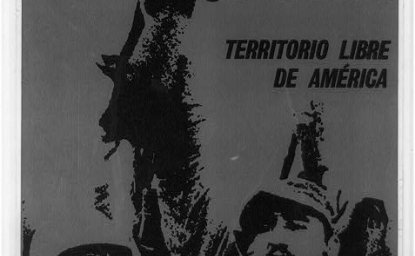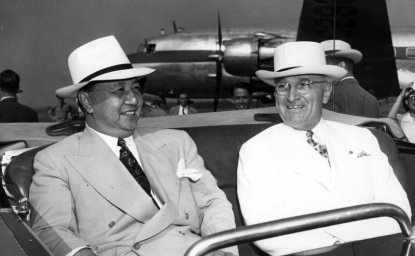The Sino-Romanian Rapprochement: Evidence and Observations from the China Side
The Cold War era witnessed a notable "special relationship" between China and Romania.

A blog of the History and Public Policy Program
The Cold War era witnessed a notable "special relationship" between China and Romania.
The Cold War era witnessed a notable “special relationship” between China and Romania, a fact well-documented by historians of the period. Both nations, estranged from the Soviet Union at various points during this tumultuous period, found common ground and established a new bond of "friendship."
However, despite the significance of this partnership, scholarly attention to its genesis remains surprisingly sparse and lacking in depth, especially on the origin of this special relationship. While existing analyses highlight Romania's quest for "independence" from Moscow through its alignment with China, they overlook the reciprocal benefits for China in this strategic relationship. Questions linger: When did Chinese leadership discern Romania's unique stance among fraternal nations? Who spearheaded the Sino-Romanian rapprochement? Most importantly, how does this diplomatic entente reflect broader patterns in Chinese foreign policy during the early 1960s?
A new set of translated Chinese documents on the Wilson Center Digital Archive helps to answer these questions. Comprised of telegrams exchanged between the Chinese Embassy in Romania and the Chinese Foreign Ministry in Beijing during the period from 1961 to 1963, in addition to one set of instructions from the Chinese Communist Party Central Committee, the documents show that Chinese government realized that Romania had a different attitude toward the Sino-Soviet Split compared to other fraternal countries as early as 1961, three years before the rapprochement between Beijing and Bucharest was actually achieved.
Several cables sent from the Chinese Embassy in Bucharest delineated "differences" between Romania and other Eastern Bloc nations, which in turn presented strategic openings for China. For instance, a report dispatched in November 1961 regarding Romania's response to the 22nd Congress of the CPSU hinted that Romania's critiques of Albania and China were comparatively tempered compared to those of its fraternal counterparts (notwithstanding the imposition of restrictions by Romanians on the Chinese embassy).
Furthermore, the Chinese Foreign Ministry also contrasted Romania's treatment of China to how Moscow's other allies in Eastern Europe treated their country. In an April 1962 telegram addressed to the Chinese Embassy in Bucharest, the Foreign Ministry noted that "Romania has its characteristics in the struggle between the two political lines and the relationship between China and Romania. Romania basically followed the Soviet Union, but it also had contradictions and distrust with the Soviet Union.”
Despite recognizing that Romania deviated from other fraternal Eastern European countries, the CCP maintained an unwavering stance towards Romania until May 1963. In response to a 1962 work plan from the Embassy in Bucharest, the Chinese Foreign Ministry directed its diplomats in Romania to "hold the ’24 word guidelines’ and the principle of unity. [You should] try to conduct some work to enhance the friendship and avoid unnecessary struggles… However, you should consider the condition of the other side. Do not be over-friendly, do not set unrealistic goals, and do not force the other side [to accept our agenda]."
The CCP's decision to maintain its policy toward Romania stemmed from two primary factors. First, there was skepticism within the CCP regarding the sincerity of Romania's distinctive stance. Analysis from the Chinese embassy suggested that the trajectory of Sino-Romanian relations was still largely tethered to the broader context of Sino-Soviet relations. This assessment posited that Romania's ostensibly "special" approach towards China was driven more by a desire to preserve a delicate equilibrium between China and the Soviet Union, rather than a genuine alignment with China's political stance. Consequently, the CCP remained uncertain about Romania's true disposition towards China.
Additionally, following the Moscow Conference in November 1960, the CCP opted to refrain from exacerbating tensions with the Soviet Union and endeavored to uphold unity among socialist nations.[1] In such a climate, openly enhancing relations with other fraternal nations without first reconciling with the Soviet Union risked being construed as a fissure within the socialist bloc. However, the situation changed drastically in late 1962 and 1963.
Significant shifts in both Romanian and Chinese foreign policies unfolded in late 1962. In April of that year, Romania opposed Khrushchev's attempt to reform the Council for Mutual Economic Association (CMEA) and advance the socialist division of labor. The Romanian Worker’s Party (RWP) contended that Khrushchev's proposals encroached upon the sovereignty of other states, contravening principles outlined in the Moscow Declaration of 1957 and 1960.
The Cuban Missile Crisis in October exacerbated tensions further. Khrushchev's unilateral decision to deploy nuclear missiles to Cuba without consulting with the RWP leader Gheorghe Gheorghiu-Dej created deep distrust between the Romanians and the Soviets.. The escalation of conflicts between the Soviet Union and Romania served as the impetus for a potential Sino-Romanian reconciliation. From October 1962, Gheorghiu-Dej began signaling to the CCP for an amelioration of Sino-Romanian relations. By April 1963, the Chinese embassy had discerned a marked shift in the RWP's stance towards the CCP.
Simultaneously, the CCP underwent a significant shift in its diplomatic approach. Seeking to rectify the political fallout from the Great Leap Forward and the Sino-Soviet Split in 1960, the CCP leadership adopted a more pragmatic stance in both domestic and diplomatic spheres from 1960 to late 1962.
However, the emerging political inclination towards critiquing the Great Leap Forward and prioritizing economic development over ideological confrontation, both domestically and internationally, triggered concern among CCP leader Mao Zedong, who saw a risk of "Soviet revisionism" within the party. At the 7,000 Cadres Conference in January 1962, Chairman Liu Shaoqi advocated for a pivot towards internal economic development. Likewise, Wang Jiaxiang, the director of the CCP’s International Liaison Department, advocated for further diplomatic overtures between China and other nations. Mao interpreted these developments as indicators of the CCP's potential slide into corruption.[2]
Therefore, Mao initiated an offensive against Liu Shaoqi and Wang Jiaxiang during the Beidaihe Working Conference in July 1962 and the 10th Plenary Session of the Eighth Central Committee. In criticizing Liu and Wang, Mao effectively reinstated the primacy of ideological struggle in both the CCP’s domestic and international policies. At the Sixth National Foreign Work Conference in November 1962, the CCP instructed its officials and diplomats to actively identify conflicts within other socialist parties and to lend support to their leftist factions.[3] The radicalization of Chinese diplomacy pushed the PRC to embrace Romanian political change.
On April 24th, 1963, Gheorghiu-Dej dispatched the Romanian ambassador to China, Gheorghe Dumitru, to clandestinely meet with CCP Central Committee member Peng Zhen. During this encounter, Dumitru extended apologies for the unjust treatment the RWP had meted out to the CCP in recent years. He also affirmed the deterioration of Soviet-Romanian relations and suggested his agreement with the CCP's assessment of Khrushchev. In light of reports from the Chinese embassy and Dumitru's visit, the CCP believed that the Soviet-Romanian conflict had sharpened. It resolved to embrace the rift between the two nations. Consequently, the CCP established a new diplomatic objective for Sino-Romanian relations.
On May 9, 1963, a policy directive issued by the CCP CC emphasized that “we should now be more active and try to persuade Romania to turn left.”
The CCPCC issued directives urging officials to adopt a warmer approach towards Romanians compared to other Eastern European nations, striving to accommodate their economic demands during negotiations. Even in cases when Romania disagreed with Chinese positions, Chinese officials were instructed to demonstrate greater empathy towards Romanians, considering the geopolitical pressures they faced.
A document from the Chinese Foreign Ministry outlining responses to Romanian Prime Minister Ion Gheorghe Maurer's article showcased China's tolerance towards Romania. In November 1963, Maurer penned an article titled "The Unshakable Foundation of International Communist Movement Unity." Despite viewing it as pro-Soviet, the Foreign Ministry advised embassies against directly criticizing or commenting on Romanian policies. Nevertheless, the CCP did not categorize Romania as it did Albania, considering the significant disparities remaining between Bucharest and Beijing on numerous fundamental issues. As per the document, the CCP regarded the RWP as a subject that realized its faults and waited to be educated by the CCP.
This cable notwithstanding, Sino-Romanian relations had experienced a notable upswing since May 1963, leading Romania to emerge as the sole Eastern European nation, alongside Albania, deemed friendly to the CCP.
Throughout the fluctuations in Sino-Romanian relations, the CCP did not merely passively acquiesce to Romanian overtures; rather, it vigilantly monitored the trajectory of Romanian politics and adjusted its approach accordingly. Crucially, the Sino-Romanian rapprochement formed a significant component of China's strategy to fracture the socialist bloc in Eastern Europe. For the CCP, the ideological shift within the RWP underscored the fragility of Khrushchev's influence over Eastern Europe. Simultaneously, the rapprochement demonstrated the potential for Chinese ideology to permeate the Eastern Bloc, bolstering the CCP's resolve to dismantle the "Soviet revisionist group" led by Khrushchev.
Cable from the Chinese Embassy in Romania, 'Initial Reactions to Maurer’s Article', 1963 November 11
Cable from the Chinese Foreign Ministry, 'What to say about Maurer’s Article', 1963 November 22
[1] Jun, Niu, “1962: The Eve of the Left Turn in China’s Foreign Policy,” in Cold War International History Project Working Paper 48, Woodrow Wilson International Center for Scholars, Washington D.C., October 2005.
[2] Danhui, Li and Yafeng Xia. Mao and the Sino-Soviet Split, 1959-1973 : a New History. Lanham: Lexington Books, 2018. 59-63.
[3] Li and Xia, 75-76, and Jun, Niu, 28-35.

A global leader in making key archival records accessible and fostering informed analysis, discussion, and debate on foreign policy, past and present. Read more


The Cold War International History Project supports the full and prompt release of historical materials by governments on all sides of the Cold War. Read more


